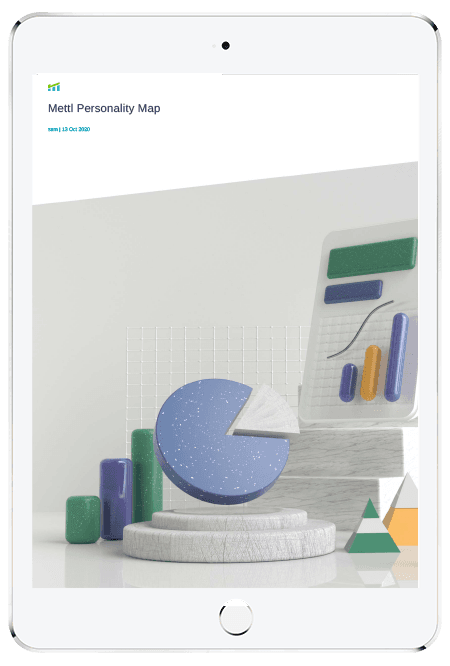Remote Work Assessment to Hire Candidates for a Remote Work Environment
Remote work assessment is a test developed by psychometricians to hire candidates best suited for remote work environments by assessing key skills like adaptability, accountability, planning and organization and collaboration with effective communication.
Ready to Use
Psychometric
All Levels
Moderate
25 Minutes
86 Questions
Executive/ Associates, Territory Managers
English India, English Global
Inside This Mettl Remote Work Assessment
Mercer | Mettl’s remote work assessment helps test the right behavioral competencies that a candidate needs in order to succeed in a remote work environment. Developed by certified psychometricians and subject matter experts, this remote work test is a powerful tool to help organizations adjust better to a shifting work culture.
It aids organizations in gaining deeper insights into remote workers’ strengths and areas of improvement.
This remote work assessment is useful for:
- Recruitment and selection of candidates
- Identifying areas of training and development
- Prioritizing developmental interventions needed to equip employees to optimize productivity & ensure business continuity
SKILL LIBRARY
Remote Work Competency Framework
Get a detailed look inside the test
Mettl Remote Work Assessment Competencies Under Scanner
Remote Work Assessment
Competencies:
Demonstrating an ability to learn new skills and effectively modify one's knowledge basis the availability of new information.
Demonstrating an ability to take responsibility for one's actions and decisions. Following through on the commitments made, without passing on blame to others in case of failures.
Demonstrating an ability to detail out the steps required to accomplish one's objectives and an understanding of the resources required to do so. Demonstrating an ability to prioritize tasks and shuffle between various tasks to maximize efficiency.
Demonstrating an ability to work effectively with each other to accomplish common goals and objectives.
Demonstrating an ability to put across one's thoughts and ideas clearly and succinctly using appropriate language.
Demonstrating an ability to adjust and adapt oneself to change and not allow oneself to get bogged down when situations are dynamic, ambiguous and constantly evolving.
Demonstrating resilience in the face of challenges or adversity and being able to manage one's emotions in a positive and effective manner.
Demonstrating a strong will to achieve what one sets out to do. Focusing one's energy and resources to finish what one has started.
Customize This Mettl Remote Work Assessment
Flexible customization options to suit your needs
Choose easy, medium or hard questions from our skill libraries to assess candidates of different experience levels.
Add multiple skills in a single test to create an effective assessment. Assess multiple skills together.
Add, edit or bulk upload your own coding questions, MCQ, whiteboarding questions & more.
Get a tailored assessment created with the help of our subject matter experts to ensure effective screening.
The Mercer | Mettl Remote Work Assessment Advantage
Frequently Asked Questions (FAQs)
1. What if a person takes an assessment in a socially desirable manner or fakes or manipulates the responses?
The assessment has been designed on the ‘semantic differential’ format, which requires candidates to consider their preferences and choose between two " equally desirable" statements. The assessment also delivers ‘instructional warnings,’ where candidates are informed that distorted or fake responses will invalidate the assessment. The assessment tool can also identify specific response patterns that may indicate fake responses.
2. Can we determine the appropriate levels of behaviors required for a specific job role in an organization?
We have taken all necessary steps to reduce the possibility of test takers trying to present themselves in a socially desirable manner. For example, the test follows a ‘semantic differential’ format, which makes it hard to ‘guess’ the appropriate response. Additionally, the items are presented in a format that requires one to consciously think about one's preferences and then choose a more ‘desirable’ statement. The tool also identifies specific patterns of the responses and can indicate if candidates attempt to respond dishonestly.
3. Will your assessment score candidates who are applying for jobs appropriately?
Yes. Mercer | Mettl has undertaken efforts to include a diverse and representative sample during assessment development. Further, Mercer | Mettl also offers options to optimize assessment content and scoring based on the context provided by our clients. Ask us about our local norms and validation, and we’ll gladly assist you with them.
4. Can a company's competency framework be mapped to the assessments?
Yes. We can provide customized assessment solutions that consider the organization’s requirements and competency framework to determine the appropriate behaviors that indicate success in the organization's context. Please write to Mercer | Mettl with the request for assistance.
5. How do we determine the norm group's proficiency level thresholds?
The normal probability distribution of scores of a particular norm group determines the proficiency levels required.
6. How are norms decided for MPP?
We have taken all necessary steps to reduce the possibility of test takers trying to present themselves in a socially desirable manner. For example, the test follows a ‘semantic differential’ format, which makes it hard to ‘guess’ the appropriate response. Additionally, the items are presented in a format that requires one to consciously think about one's preferences and then choose a more ‘desirable’ statement. The tool also identifies specific patterns of the responses and can indicate if candidates attempt to respond dishonestly.
7. What if the reports generated for the psychometric assessments differ from the actual behavior, attitude or aptitude of the person?
We have taken all necessary steps to reduce the possibility of test takers trying to present themselves in a socially desirable manner. For example, the test follows a ‘semantic differential’ format, which makes it hard to ‘guess’ the appropriate response. Additionally, the items are presented in a format that requires one to consciously think about one's preferences and then choose a more ‘desirable’ statement. The tool also identifies specific patterns of the responses and can indicate if candidates attempt to respond dishonestly.


